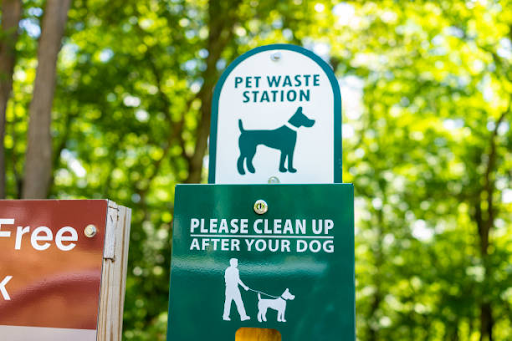As responsible pet owners, it's crucial to address the impact of pet waste on our environment and health. Did you know that an average-sized dog produces approximately 274 pounds of waste per year? That's a staggering amount that can have detrimental effects if not managed properly. In this blog, we will explore the significance of responsible pet waste management, understand current community practices, and most importantly, equip you with essential questions to ask about pet waste management in your community. Let's take the first step towards creating a cleaner and healthier environment for all.
The Significance of Responsible Pet Waste Management
In our communities, responsible pet waste management plays a crucial role in maintaining a clean and healthy environment for all. Addressing the pinpoints of this issue is essential, as pet waste can have adverse effects on our surroundings and public health. Pet waste left unattended can contaminate water sources, posing a threat to both humans and animals.
By properly disposing of pet waste and adhering to guidelines, we can prevent the spread of harmful bacteria and parasites. Implementing designated pet-friendly areas with waste disposal facilities can also help manage the problem effectively.
Let's work together to promote responsible pet ownership and make our communities safer and cleaner for everyone.

Understanding Community Pet Waste Management Practices
A. Identify Current Pet Waste Management Practices in Communities:
In this section, we delve into the existing pet waste management methods adopted by communities. Common practices include the use of pet waste stations with disposal bags and designated pet-friendly areas. By addressing the pinpoints, we shed light on how communities are currently handling pet waste and the measures taken to maintain cleanliness.
B. Analyze the Effectiveness of These Practices:
Here, we evaluate the success of the identified pet waste management practices. We assess factors such as adherence to guidelines, community participation, and overall cleanliness. Analyzing the effectiveness helps us understand which methods yield the best results in keeping public spaces free from pet waste.
C. Discuss Potential Challenges Faced by Communities in Managing Pet Waste:
This part examines the obstacles communities encounter in managing pet waste. From lack of awareness to insufficient resources, we address the pinpoints that hinder effective waste management. By recognizing these challenges, we can work towards finding practical solutions to create cleaner and more pet-friendly environments.
Best Practices and Innovative Solutions
A. Research and present successful examples of community pet waste management programs
Discovering successful community pet waste management programs can address the pinpoints in this crucial matter. These exemplary initiatives showcase effective methods to tackle pet waste challenges while promoting environmental preservation and public health. By examining these success stories, communities can adopt similar strategies tailored to their unique needs and resources.
B. Discuss innovative technologies or strategies being used in other communities
Innovative technologies and strategies play a vital role in pet waste management. By discussing the latest advancements used in other communities, we can explore practical and sustainable solutions. These innovations may include automated waste disposal systems, biodegradable waste bags, or creative awareness campaigns. Embracing such approaches can significantly improve overall pet waste management efficiency and encourage community participation.
C. Provide practical tips for individuals to promote responsible pet waste disposal
Encouraging responsible pet waste disposal starts with individuals taking simple yet impactful actions. Offering practical tips on waste bag availability, designated disposal areas, and proper disposal techniques can empower pet owners to contribute positively. Responsible pet waste disposal is essential for maintaining cleanliness, protecting public health, and preserving the environment for everyone's benefit.

Overcoming Challenges and Obstacles
In the journey towards effective community pet waste management, we encounter various challenges that demand our attention and determination. Addressing these pinpoints head-on is crucial for a cleaner and healthier environment for both pets and humans.
One prominent challenge is the lack of awareness among pet owners regarding responsible waste disposal. Educating residents about the environmental and health impacts of pet waste is essential to bring about positive change. Additionally, limited access to pet waste disposal facilities in public spaces poses another obstacle.
To overcome these challenges, community collaboration is key. Implementing regular awareness campaigns and distributing free waste disposal bags can encourage responsible pet ownership. By working together, we can create a pet-friendly community that fosters responsible waste management and safeguards our surroundings for generations to come.
Conclusion
In conclusion, addressing the pinpoints in community pet waste management is vital for fostering a cleaner and healthier environment. By asking the right questions and implementing effective solutions, we can make a positive impact on our communities.
To address the pinpoints, communities should focus on establishing clear guidelines and regulations for pet waste disposal. By providing accessible resources like pet waste stations and bags, we encourage responsible pet ownership. Designated pet-friendly areas with waste disposal facilities further promote cleanliness.
Education plays a crucial role in creating awareness about the importance of proper pet waste management. Through advocacy and community collaboration, we can overcome challenges and develop innovative solutions. Together, let's take action to create pet-friendly neighborhoods and protect the well-being of our beloved pets and fellow citizens.
Frequently Asked Questions (FAQ)
A.Community pet waste management is essential to maintain a clean and hygienic environment. Pet waste can contain harmful bacteria and pollutants that, if left unattended, can contaminate water sources and pose health risks to both pets and humans. By managing pet waste responsibly, we can protect public spaces, improve community health, and promote a safer living environment for everyone.
A.If your community lacks a pet waste management program, take the initiative to raise awareness and advocate for one. Engage with local authorities, fellow pet owners, and community organizations to address the issue. You can also organize educational campaigns to spread awareness about responsible pet waste disposal and the importance of implementing a community-wide program.
A.Yes, many communities have established penalties for not following pet waste management guidelines. These penalties are in place to encourage compliance and discourage irresponsible pet waste disposal. Penalties may include fines or other measures designed to incentivize responsible pet ownership. By adhering to the guidelines, you can help keep your community clean and avoid any potential fines.
A.Reporting pet waste-related issues is essential for effective management. Contact your local authorities or community services to report areas where pet waste is not properly disposed of or if you notice a lack of pet waste facilities. By reporting such issues, you contribute to the overall cleanliness and well-being of your neighborhood, encouraging better pet waste management practices.
A.As an individual, you can play a significant role in promoting responsible pet waste disposal. Always carry pet waste bags with you during walks and clean up after your pet. Encourage others to do the same and educate fellow pet owners about the importance of proper waste disposal. Participate in community clean-up events and support local initiatives for pet waste management. Together, small actions can make a big difference in creating a pet-friendly and cleaner community.



